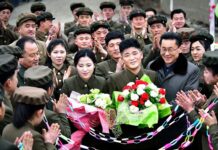33 National Assembly members, including Democratic Labor Party member Kang Ki Kab, have put forward a piece of legislation promoting the resumption of rice aid to North Korea.
Kang explained in a press conference on Tuesday, “This legislation, taking into account North and South Korea’s rice supply and demand forecasts, prioritizes the preparation and implementation of a rice aid policy.”
Kang believes that such a policy could help create an atmosphere of peaceful unification while removing the imbalance in rice supply and demand between the two Koreas.
Kang stated, “As our farmers experienced this year, the price of rice in South Korea tends to rapidly decline if there is an increase in production of 100,000 tons over the previous year. Meanwhile, the North is one of the 32 countries designated by the UN Food and Agriculture Organization (FAO) as requiring immediate outside food aid due to its perennial struggle with crop shortages.”
He concluded, “We need to make a wise choice which helps to prevent both a famine in the North and disturbances to the price of rice in the South.”
However, the Ministry for Food, Agriculture, Forestry and Fisheries maintains that aid to North Korea is not an appropriate solution to the rice stockpiling issue in South Korea.
However, Kang disagrees, “Increasing the demand for rice, as insisted upon by the South Korean government, is an important issue, one which needs to be persistently pursued, but it cannot serve as an immediate response. Instead, practical measures are needed, but the government doesn’t seem to care.”
But before we even consider agreeing to such legislation, there is a need to examine both the reality with which South Korea is faced and the North’s attitude.
North Korea attempted a nuclear test in May. Despite the invocation of a sanctions resolution by the UN, the North has not abandoned its stubborn attempts to gain recognition as a nuclear power.
Under such conditions, sending aid to the North under the pretext of increasing the demand for rice in South Korea will not only fail to improve but may indeed worsen the situation that exists between North and South Korea.
The North refused to offer a word of apology after both the shooting of South Korean civilian Park Wang Ja at Mt. Geumgang in July of last year and the death of six South Korean campers on the Imjin River last weekend, announced that all Kaesong Industrial Complex contracts would be unilaterally annulled in May, and forcibly detained a South Korean Kaesong Complex employee for 136 days earlier this year. All these events have been detrimental to inter-Korean relations.
In this situation, sending aid to the North will only continue the erroneous legacy of the Sunshine Policy whereby South Korea supports North Korea regardless of its provocations and the detention of and injury caused to South Korean citizens at the hands of the North Korean authorities.
Of course, humanitarian aid and political issues cannot always be linked. But given the North’s recent fuelling of the confrontational state of affairs and its carrying out of nuclear tests, it is clear that humanitarian assistance cannot be unconditional in nature.
Further, the usage of that food aid which does flow into North Korea should be reexamined. The annual amount of food aid sent by the South Korean government and international society to the North is approximately one million tons.
Yet, the North Korean authorities have repeatedly failed to distribute the food transparently, instead diverting aid to the army or for the personal consumption of the elite while providing inadequate or non-existent food rations to citizens.
If the food aid which is meant for North Korean citizens groaning from hunger only fills the stomachs of the army and the elite, then it is very hard to call it humanitarian aid. This amounts to little more than strengthening the North Korean regime and propping up the elite.
Consequently, the international community and the South Korean government have demanded the strengthened monitoring of food distribution, but the North simply insists that it will not receive food aid at all.
In order for the legislation being pursued by Democratic Labor Party member Kang to coincide with real humanitarian needs, the highest priority is to demand transparency from North Korea. Otherwise, no South Korean citizen should support this naive effort.




















